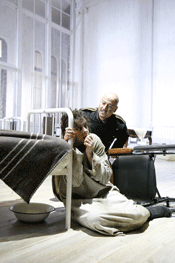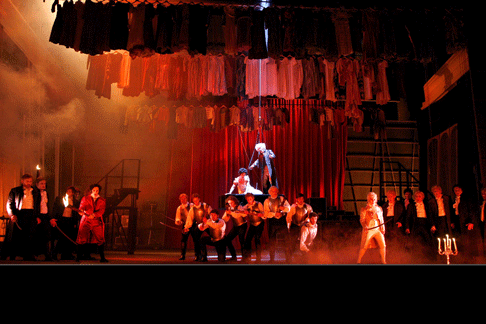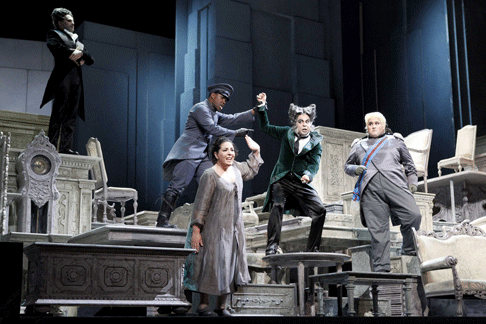24 Aug 2010
Sigismondo, La Cenerentola, Demetrio e Polibio at Pesaro
The fourteen year old Rossini composed his first opera Demetrio e Polibio in 1806 though it was not performed for another six years.

The fourteen year old Rossini composed his first opera Demetrio e Polibio in 1806 though it was not performed for another six years.
He was twenty-two when he composed the tragedy Sigismondo and only twenty-five when he wrote La Cenerentola (the last of the four Italian comedies that are now stables of the standard repertory)! This was the stuff of the thirty-first Rossini Opera Festival.
Rossini was born in Pesaro, though he left when he was eight years old. He somehow retained enormous affection for his birthplace, returning in 1818 to conduct La Gazza Ladra in a performance that inaugurated Pesaro’s new Teatro Nuovo (now named the Teatro Rossini). In 1864, three years before his death (in his seventy-third year) Rossini was again in Pesaro for the unveiling of his statue in bronze (a gift to the city by a Parisian and a Madrilian) that now sits in the courtyard of the music school he pledged his fortune to found.
These days legions of Rossinians from around the world harbor great affection for Pesaro because it is home to the Rossini Foundation that resurrects the Rossini oeuvre in pristine editions to be performed by the annual (since 1980) Rossini Festival, These days Pesaro itself is a not-too-attractive beach town where it is hard to find a quiet hotel and a good restaurant. Plus the festival occurs across the sacrosanct Feast of the Assumption when every Italian who can walk or be pushed find themselves at the beach — it might be hell but it is heaven.
This festival edition was the young Rossini (though all Rossini is relatively young as he wrote his last opera at age thirty-seven). And youth was present wherever you looked and listened. The Rossini Foundation had restored Demetrio e Polibio to its original form, purging the goosed up version Rossini had concocted for its belated premiere. Thus it was the adolescent Rossini with a clumsy libretto, imitative vocabulary and tentative bravura. Strangely the opera gave little clue that it was composed by the man would soon, very soon become the world’s greatest opera composer (be aware that it takes awhile for Rossini euphoria to wear off).
One of Italy’s more able stage directors, Davide Livermore, was in charge of a group design students of Urbino’s Accademia di Belle Arti and together they came up with the very good idea of suggesting that this little opera might be best left on the shelves of the Rossini archives.
 Barcellona and Siragusa [Photo by Studio Amati Bacciardi]
Barcellona and Siragusa [Photo by Studio Amati Bacciardi]
It was a witty resolution. The back wall of the Teatro Rossini became the proscenium opening and the real proscenium became a transparent wall through which we would soon spy on the ghosts of the darkened theater. But first we saw all those kids from the Accademia di Belle Arti packing up some other show, and of course the ever present fire inspectors getting in the way, nonchalant because fires (a constant and real danger) so rarely happen. But this is Italy where everyone smokes (or used to), so one of the inspectors saw no reason not to light up.
This Demetrio e Polibio was a frenzy of jokes, a play on commedia dell’arte lazzi (sight gags) and they flowed throughout the evening, one after another, most subject to the libretto’s indication that a fire somehow broke out while Eumene abducts Lisinga. We learned that theatrical technology has discovered a flame that smokes but does not burn and these quite real flames were passed around a lot. Add to this lighted candelabras that flew across the stage and even out across the pit and halfway back into the auditorium.
But once the young design students had got the departing show packed up and had left the stage, and the fire inspectors had made their last round the stage became alive with the ghosts of theater all in period costumes, here the aforementioned Eumene who is really Demetrio, king of Syria, and Siveno, his son (but nobody knows this) who loves Lusinga. Both lovers call Polibio, king of Parthia, their father. Through all this the lazzi kept us amused, and charmed for the fairly brief duration of the opera.
And the young singers were equally charming. Casting was based on promise more than on accomplishment, with our interest piqued as to what Pesaro artistic director Alberto Zedda hears in these voices that encourages him to provide such important opportunity to fledgeling artists. Italian bass Mirco Palazzi shone as Polibio, as did tenor Chinese tenor Vlhe Shi who was Demetrio, Last season Mr. Shi, already a fine Rossini singer, was a tentative Comte Ory but here presented himself as a far more finished artist. Russian mezzo Victoria Zaytseva delivered a plausible Siveno, while Spanish soprano María José Moreno popped out big voiced high E’s with aplomb but was not a convincing Lisinga.
Davide Livermore is a stage director of great sophistication who brought an abundance of theatrical technique to this production. Maybe an over-abundance. But Italian conductor Corrado Rovaris managed to hold the young Rossini’s own, evoking fine playing from the Orchestra Sinfonica G. Rossini (rarely present for the festival’s main-stage productions) and urging his singers to excellent performances with tempi that were delightfully driven and never over-challenging. It was a successful collaboration.
 [Photo by Studio Amati Bacciardi]
[Photo by Studio Amati Bacciardi]
The Rossini Festival seems to have been nurturing young Venetian stage director Damiano Michieletto, who returned to stage Sigismondo even though he provided an unimaginative, lackluster La scala di seta last summer. Mr. Michieletto must watch a lot of prime time television as he had turned La scala di seta into pure run-of-the-mill TV sit-com. This summer he made Sigismondo into a classic made-for-TV horror movie (low budget, low taste). At intermission disgust was everywhere and very appropriate.
Sigismondo has attacks of madness because he had had his wife put to death for a supposed infidelity that he now seems unsure of. Unbeknownst to him she escaped by assuming another identity, and strangely she still loves him. Thus there was lots to sing about and Rossini saved the day. But not until well into the second act when Sigismondo and Aldimira managed with extended difficulty to reconcile. Complex emotionally, musically and vocally it was the stuff if not the essence of the great Rossini.
Two veteran Italian Rossinians set the pace, Antonino Siragusa as the villain and Daniela Barcellona as the protagonist. Mme. Barcellona is the epitome of the pants-role mezzo, tall of stature with a large, round burnished voice that magnificently soars to the occasion when agility is demanded. Her aria Vincesti, iniqua sorte brought the house down (Rossini Festival audiences like nothing more than to roar approval). Mr. Siragusa is the epitome of the Rossini villain, a shaved head and a cutting voice that became exceptionally expressive and musically brilliant when Ladislao (his character) repented in his spectacular Misero me!
Youth came to the fore in the casting of young Russian soprano Olga Peretyatko as the unhappy queen Aldimira. If in the first act she seemed miscast, an ingenue asked to play a tragic queen. In the second act she shed all doubt as to her queenliness in her splendid, extended scene with the chorus Ah, Signor! nell’alma mia tu non leggi, tu non vedi.
Without showpieces the balance of the cast fell victim to the production set in a mental ward in the first act, the supernumerary inmates frequently mauling the principals and then following them into the halls of state in the second act where the molesting continued.
The weird solo-wind instrument in the overture was a piccolo playing in a very low register, though later Rossini gave it even more brilliant solo opportunity. Surprising too was the double bass solo — the young Rossini having fun experimenting with orchestral colors. The orchestra of Bologna’s Teatro Comunale offers a fine, finished sound that Pesaro-born conductor Michele Mariotti, Bologna’s music director, exploited to the fullest in sympathetic participation with his singers in the opera’s showpieces.
 Esposito, Brownlee, Pizzolato, Bordogna, Alaimo [Photo by Studio Amati Bacciardi]
Esposito, Brownlee, Pizzolato, Bordogna, Alaimo [Photo by Studio Amati Bacciardi]
Canadian-born young conducting star Yves Abel was at the helm for La Cenerentola, propelling it onto plateaux of extended lyricism that approached delirium (Rossini mania again). It was an inspired collaboration with Italian master stage director Luca Ronconi (now 77 years-old) and his co-director Ugo Tessitori in a revival of his 1998 Pesaro production. Add to this a brilliant young cast and a bit of luck — the original Cinderella, Kate Aldrich, backed out and was replaced by Marianna Pizzolato — though Mme. Aldrich may be from Maine she reads as pure Kansas while la Pizzolato is cento per cento italiana. Her voice is large, well-focused and agile and her persona even projects goodness. Not to mention that last summer she stole the show as nurse to Mme. Aldrich’s Zelmira.
This Italian comedy based on the familiar fairytale offers two buffo roles, Cinderella’s father and the the prince’s page. Unusual for productions of this Rossini masterpiece was the youth of these buffo interpreters, here Italians Paolo Bordogna as Don Magnifico and Nicola Alaimo as Dandini. The comparative lightness of their voices allowed Mo. Abel to take the patter songs at breakneck speed and Mr. Ronconi to exploit their physical agility thus setting a tone for these roles that was otherworldly. The prince’s troublemaking tutor Alidoro was played by Italian bass Alex Esposito who possesses a voice of exceptional beauty that both conductor and director used with magical effect to diplomatically reconcile (sort of) the Don Magnifico family situation.
The stepsisters are thankless roles, with only Clorinda given a brief, hopeful aria. Here they were lightly played and sung by French soprano Manon Strauss Evrard as Clorinda and Spanish mezzo Cristina Faus as Tisbe. American tenor Lawrence Brownlee contributed fine singing and an appropriate if generic presence as Don Ramiro (the prince).
La Pizzolato is an unlikely Cenerentola given that she does not fit into the classic princess mold. In fact she seemed right at home in Don Magnifico’s kitchen. But she too could dream, and that she did with consummate vocal finesse and bravura. There can be no doubt in our minds that these were the attributes (not her goodness) that won her the throne. After all this is Rossini.
The Ronconi production is a masterwork. It is huge, heavy and complicated and this added to the impression that La Cenerentola is Rossini’s biggest and best comedy. Put this together with the celerity of the music and action and it seemed very witty indeed that we sat in complete silence for five minutes to watch Don Magnifico’s jumbled household lifted by cables to the rafters slowly, but very slowly. Little by little the Palace rooms were revealed with not just the one over-sized chimney of Don Magnifico’s kitchen (now transformed into a very grand chimney) but a jumble of massive, very grand fireplaces.
Luca Ronconi’s knows that Rossini’s music is architectural, thus the large pile of furniture that was Don Magnifico’s house and the fireplace jumble of the palace provided many levels and places on which the singers could stand to deliver the music. Action was accomplished by moving from singing position to singing position rather than by inventing stage business in an attempt to create comedy. And Ronconi had no fear of stopping movement while musical development took place, particularly effective in the big ensembles though this technique worked just as well in arias.
The massive fireplace palace was constructed of merging levels and spaces into which the chorus, the men of Bologna’s Teatro Comunale, intruded always as a formally dressed phalanx. This sheer size and complexity echoed the complexity of the very largest of the Rossini Cenerentola ensembles and the flashiest of its aria showpieces. When it got truly rolling in the second act the ovations got truly huge and clapping, shouting and stomping became part of the Rossini fun.
Michael Milenski